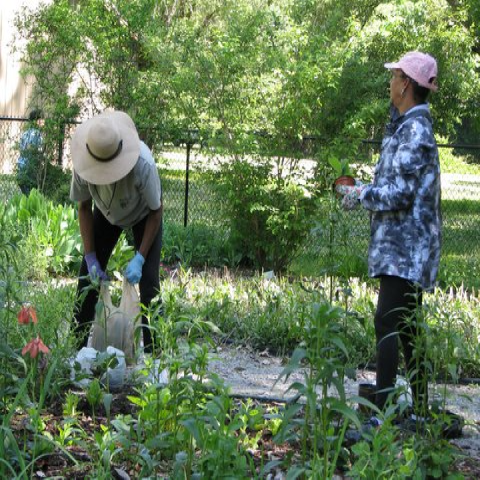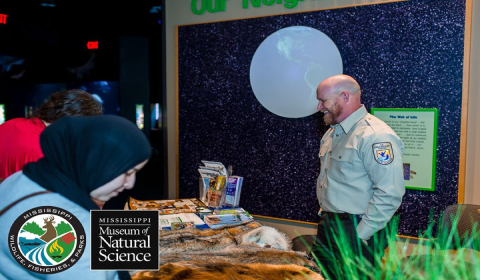Ways to Get Involved
Whether you want to further conservation, learn more about nature or share your love of the outdoors, you’ve come to the right place. National Wildlife Refuges provide many opportunities for you to help your community and fish and wildlife by doing what you love.
National Wildlife Refuges partner with volunteers, youth groups, landowners, neighbors and residents of urban and coastal communities to make a lasting difference.
Find out how you can help make American lands healthier and communities stronger while doing something personally satisfying.
Volunteers: Gain new experiences and meet new people while helping to advance wildlife conservation.
Friends: Join neighbors in helping Refuges restore habitat and expand access to green space.
Landowners: Learn how you can partner with the Fish and Wildlife Service to voluntarily restore land.
Local Groups:
Find out how communities can work with Refuges better for wildlife and people.
Youth: Explore paid and unpaid opportunities to learn and develop leadership skills.
Volunteering
Discover for yourself what tens of thousands of volunteers have learned: Volunteering for the U.S. Fish and Wildlife Service is fun and rewarding in many ways. Master new skills. Meet new friends. Enjoy a sense of accomplishment from doing your part to further wildlife conservation for the pleasure of generations to follow. Check out our station's latest volunteer opportunities on volunteer.gov
Volunteers serve a vital role in helping the USFWS fulfill its mission of conserving, protecting and enhancing America’s fish and wildlife and their habitats. Interns are volunteers; however, they work full-time for a given period of time. Other volunteers may work intermittently. The amount of time you volunteer is up to you. You may work full time, a few hours per week or month, or during a particular season. Interns often work on a specific schedule and assist with activities like surveying birds, managing moist-soil areas, or banding wood ducks.
No special skills are needed to be a USFWS volunteer. While there is no age limit, anyone under 18 years must have written parental approval. Organized group participation is welcomed and encouraged. Volunteers are welcome regardless of race, religion, age, gender, nationality or disability. Interns interested in habitat management, wildlife management, biological themes, research, or other Refuge-oriented goals and missions are encouraged to contact us.
Volunteers and interns are valuable to the management of our Nation’s fish and wildlife resources. You can enjoy a productive and rewarding experience as a volunteer or intern on Refuges in the Theodore Roosevelt NWR Complex. Sign up today: Send your name, address, phone number, e-mail address and your interests and qualifications to TRNWRComplex@fws.gov We will do the rest!
You can also check out volunteer opportunities at other Refuges throughout the United States by visiting http://www.fws.gov/volunteers/.
Our Partners
Nature does not recognize human-made boundaries. In order to conserve our natural and cultural resources effectively, we must work with others to bridge these boundaries. Partnerships foster creative solutions to challenging situations and often the results are greater than the sum of the parts. Learn more about our local partners.
The Theodore Roosevelt Complex works regularly with several different partners. A list of partners and descriptions of their work can be found below. This list is ever changing and evolving as we forge new partnerships to accomplish conservation goals.
The Yazoo County Wildlife Association and MS Lower Delta Partnership are two partners of Panther Swamp NWR that support the Refuge in efforts to provide good quality outdoor activities that encourage individuals to get outside and enjoy nature.
Mississippi Department of Wildlife, Fisheries, and Parks (MDWFP)
A provision of the 1997 Refuge Act and subsequent agency policy is that the Service shall ensure timely and effective cooperation and collaboration with other federal agencies and state fish and wildlife agencies during the course of acquiring and managing Refuges. This cooperation is essential in providing the foundation for the protection and sustainability of fish and wildlife throughout the United States.
The Mississippi Department of Wildlife, Fisheries, and Parks is a state-partnering agency with the Service, charged with enforcement responsibilities for migratory birds and endangered species, as well as with managing the state’s natural resources. The State of Mississippi owns or manages 828,408 acres for wildlife, recreation, and fisheries, including 42 wildlife management areas (WMAs) and 29 state parks encompassing 823,297 acres, and 21 lakes totaling 5,111 acres.
The MDWFP coordinates the state’s wildlife conservation program and provides public recreation opportunities, including an extensive hunting and fishing program, on several WMAs and parks located near the Complex. The MDWFP’s participation and contribution throughout this comprehensive conservation planning process has been invaluable. This agency continues to work with the Service to provide ongoing opportunities for open dialogue with the public on fish and wildlife issues in Mississippi. Not only has the MDWFP participated in biological reviews, public meetings, and field reviews during this process, but also the MDWFP is an active partner in annual hunt coordination planning and in various wildlife and habitat surveys. A key part of the comprehensive conservation planning process is the integration of common mission objectives between the Service and the MDWFP, where appropriate.
Wildlife Mississippi has been dedicated to conserving Mississippi's lands, waters, and natural heritage for almost 15 years. WM achieves this through Habitat Conservation, Conservation Policy, Conservation Education, and Outdoor Recreation.
Ducks Unlimited is the world's leader in wetlands and waterfowl conservation. DU got its start in 1937 during the Dust Bowl when North America’s drought-plagued waterfowl populations had plunged to unprecedented lows. Determined not to sit idly by as the continent’s waterfowl dwindled beyond recovery, a small group of sportsmen joined together to form an organization that became known as Ducks Unlimited. Its mission is habitat conservation. Ducks Unlimited conserves, restores, and manages wetlands and associated habitats for North America's waterfowl. These habitats also benefit other wildlife and people.
Animal and Plant Health Inspection Service (APHIS)
Established in 1972, the Animal and Plant Health Inspection Service (APHIS) is a relatively new Agency, but much of the important work that falls under its mission today has been the responsibility of the U.S. Department of Agriculture (USDA) for more than 100 years. In fact, for most of the 20th century, the early animal and plant health bureaus within USDA operated independently of one another. The creation of APHIS consolidated these functions. In the years since, the Agency has continued to expand its mission in order protect and preserve American agriculture.
Lower Mississippi Valley Joint Venture (LMVJV)
The Lower MS Valley Joint Venture is a self-directed, non-regulatory private, state, and federal conservation partnership that exists for the purpose of sustaining bird populations and their habitats within the Lower Mississippi Valley and West Gulf Coastal Plain regions through implementing and communicating the goals and objectives of relevant national and international bird conservation plans. The Lower Mississippi Valley Joint Venture functions as the forum in which the private, state, and federal conservation community develops a shared vision of bird conservation for the Lower Mississippi Valley and West Gulf Coastal Plain regions; cooperates in its implementation; and collaborates in its refinement. Our partnership focuses on the protection, restoration, and management of birds in the Lower Mississippi Valley and West Gulf Coastal Plain regions and their habitats.
Outreach
One of the most important roles of a National Wildlife Refuge is that of environmental education and outreach. There are many outreach events Panther Swamp NWR and the Theodore Roosevelt NWR Complex as a whole have participated in. Each year, Panther Swamp NWR has hosted a Fishing Rodeo, where the community comes together and people of all stages of life learn to fish or just join in on the fun! The Theodore Roosevelt NWR Complex has also had a booth annually at the Great Delta Bear Fair, a wonderful outreach event to learn the rich history of the Mississippi Delta, and the "Teddy Bear Story". The Complex has also participated in outreach events in collaboration with the Mississippi Natural Science Museum. Panther Swamp NWR is dedicated to environmental education & outreach events as they come and therefore environmental education tools, field trips, and even our NEW Junior Refuge Manager Booklet are available upon request.


